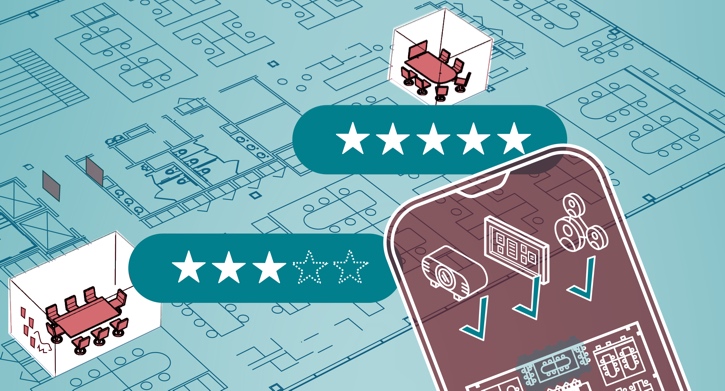Event
Recap
Elevating Workplace Intelligence: Leveraging AI for Enhanced Experience and Building Performance

Embracing AI in Workplace Design
In the latest installment of our 2024 webinar series, PLASTARC hosted a conversation amongst industry leaders about the burgeoning role of artificial intelligence (AI) in revolutionizing workplace environments. Titled "Elevating Workplace Intelligence: Leveraging for Enhanced Experience & Building Performance”. The panel discussion featured Dan Stine, Director of Design Technology at Lake | Flato Architects; Elena Beloshapkova, CEO and Founder of inspace, an AI-driven workplace platform; and Federico Negro, Founder and CEO of Canoa Supply, a sustainable interior design software company. Together, they delved into some of the ways in which AI is poised to enhance workplace design, employee experience, and building performance.
The Dawn of AI in Workplace Design
Highlighting various AI-powered tools, Dan Stine showcased how, when applied correctly, AI is facilitating a more intuitive and efficient design approach that enables architects and designers to leverage predictive insights and adaptive solutions. From real-time rendering to early energy modeling, the integration of AI in design tools is not only optimizing the aesthetic and functional aspects of workplaces but also paving the way for sustainability and efficiency.
Stine was thrilled by how quickly useful AI-assisted tools are evolving. “It seems like every day there's a new AI-enabled tool available: from real-time rendering visualization software like Enscape that uses AI to upscale resolution, making it possible to work on bigger models more efficiently, to Autodesk Insight, which utilizes AI to calculate multiple values for each input, allowing exploration of different configurations of wall assemblies and window types."
Revolutionizing Employee Experience with AI
Elena Beloshapkova proceeded to emphasize AI's pivotal role in refining each employee’s workplace experience. Through inspace, Beloshapkova has demonstrated AI’s ability to customize work environments so that those spaces can more closely align with individual preferences and organizational goals. AI uses data sets that capture occupancy and usage patterns to dependably forecast and adapt spaces to anticipate the workforce’s changing needs, thereby enhancing overall productivity and satisfaction.
“Our platform asks you to measure everything for a couple of weeks, [and then it will provide] predictions on how your space will be used not just by anyone, but by your specific company, by your specific team members,” she remarked. This level of personalization, driven by AI, fosters a more engaging and conducive work atmosphere, which proves that technology can be effectively used to serve the people who make up your organization.
Fostering Sustainable Workplace Solutions
As the conversation went on, Federico Negro underscored AI's potential to help advocate for architectural choices that make workplaces not only happier and healthier, but more sustainable as well. By enabling designers to make informed decisions regarding sustainable materials and designs, AI platforms like Canoa Supply are at the forefront of promoting environmental stewardship within the workplace. "The vast majority of the work that goes unseen in our cities is all of this constant retrofitting that happens over and over again,” Negro added. By rendering these kinds of retrofits less necessary, platforms like Canoa “can make design a largely positive force in our world. And so the more that we can get design [tools] out into the world…the better.”
Navigating Ethical Considerations & Future Directions
Of course, the panel would have been remiss to ignore the ethics of widespread AI implementation in the workplace. The conversation touched on questions of privacy, data protection, and what it means to use AI in a way that respects individual rights while harnessing its potential to improve workplace dynamics. This discourse highlighted the need for ethical frameworks that will guide the deployment of AI technologies and ensure they serve to enhance rather than compromise the quality of work life.
The panelists also ventured into speculative territory, pondering the future trajectory of AI in workplace design. They unanimously recognized the untapped potential of AI to further democratize design, personalize employee experiences, and drive sustainable practices. But they also cautioned against complacency, emphasizing the continuous evolution of AI and the need for ongoing dialogue, research, and ethical vigilance to fully realize its benefits.
AI will prove increasingly essential as it continues to evolve, which means that architects, designers, and workplace strategists must continue to embrace AI with an open yet critical mindset. As we stand on the cusp of a new era in workplace innovation, integrating AI into our work environments will be an essential but highly complex undertaking.
Looking Forward
Join us for the next installment of PLASTARC’s 2024 webinar series on demographic trends in real estate. We’ll be discussing the factors organizations must take into account as they contemplate changes to their portfolios. Experts and thought leaders will share guidance on choosing spatial strategies that incorporate functional, demographic, geographic, and cultural factors.

